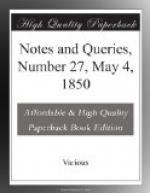Mr. Dixon’s version was taken down from the singing of an eccentric character, known as the “Skipton Minstrel,” and who used to sing it to the tune of “The Bold Pedlar and Robin Hood.”]
Monody on the Death of Sir John Moore (No. 20. p. 320.).—This Query has brought us a number of communications from “A.G.,” “J.R.W.,” “G.W.B.,” “R.S.,” and “The Rev. L. COOPER,” who writes as follows:—
“The undoubted author is the late Rev. Charles Wolfe, a young Irishman, curate of Donoughmore, diocese of Armagh, who died 1823, in the 32nd year of his age. His Life and Remains were edited by the Archdeacon of Clogher; and a fifth edition of the vol., which is an 8vo., was published in 1832 by Hamilton, Adams, and Co., Paternoster Row. At the 25th page of the Memoir there is the narration of an interesting discussion between Lord Byron, Shelley, and others, as to the most perfect ode that had ever been produced. Shelley contended for Coleridge’s on Switzerland; others named Campbell’s Hohenlinden and Lord Byron’s Invocation in Manfred. But Lord Byron left the dinner-table before the cloth was removed, and returned with a magazine, from which he read this monody, which just then appeared anonymously. After he had read it, he repeated the third stanza, and pronounced it perfect, and especially the lines:— {446}
“’But
he lay like a warrior taking his rest,
With
his martial cloak around him.’
“‘I should have
taken the whole,’ said Shelley, ’for a
rough
sketch of Campbell’s.’
“‘No,’ replied
Lord Byron, ’Campbell would have claimed it,
had
it been his.’
“The Memoir contains the fullest details on the subject of the authorship, Mr. Wolfe’s claim to which was also fully established by the Rev. Dr. Miller, late Fellow of Trinity, Dublin, and author of Lectures on the Philosophy of Modern History.”
[With regard to the French translation, professing to be a monody on Lally Tollendal, and to be found in the Appendix to his Memoirs, it was only a clever hoax from the ready pen of Father Prout, and first appears in Bentley’s Miscellany. No greater proof of the inconvenience of facetiae of this peculiar nature can be required than the circumstance, that the fiction, after a time, gets mistaken for a fact: and, as we learn in the present case, the translation has been quoted in a French newspaper as if it was really what it pretends to be.]
* * * * *
IRON RAILINGS ROUND ST. PAUL’S.
As the removal of the iron railing which surrounds St. Paul’s Churchyard is now said to be in contemplation, P.C.S.S. imagines that it may not be unacceptable to the readers of “NOTES AND QUERIES,” if he transcribes the following account of it from Hasted’s Kent, vol. ii. p. 382, which is to be found in his description of the parish of Lamberhurst:—




